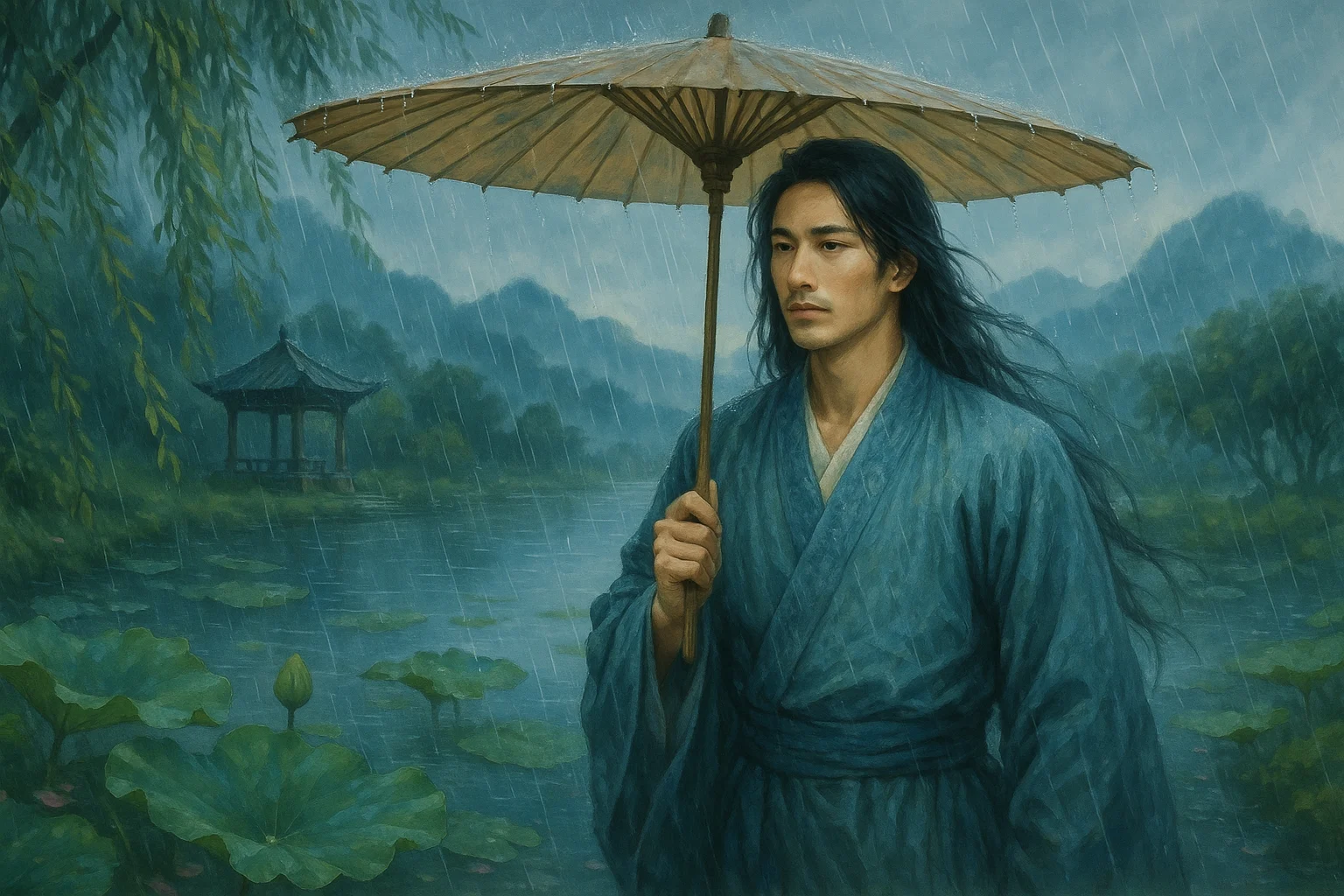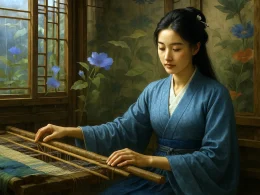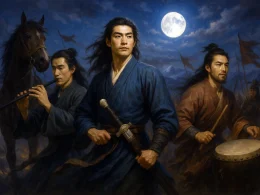The misted rain yet haunts the dying spring,
My courtyard lies in twilight’s languid wing.
"Seek we new rhymes," I murmur to the air,
And lift the wine-cup to dispel despair.
White thorn-mallows in hair—unchanged they gleam,
Like frozen starlight in time’s silent stream.
Not that my verse comes tardy to the page,
But lest my pen augment her tender age.
Original Poem
「生查子 · 残春雾雨余」
吕本中
残春雾雨余,小院黄昏后。
说道觅新词,把酒来相就。
酴醿插髻云,岁岁长如旧。
不是做词迟,却怕添伊瘦。
Interpretation
This lyric was composed during Lü Benzhong's residence in Jiangnan after the Southern Song's relocation south. The lingering spring mist and rain—both a seasonal phenomenon and an emotional trigger—frame an intimate scene of literary gathering spiced with quiet concern. Characteristic of Lü's style that blends delicate observation with deep sentiment, the poem transforms a casual verse-composing party into a tender meditation on companionship and the passage of time.
Upper Stanza: "残春雾雨余,小院黄昏后。说道觅新词,把酒来相就。"
Cán chūn wù yǔ yú, xiǎo yuàn huáng hūn hòu. Shuō dào mì xīn cí, bǎ jiǔ lái xiāng jiù.
Late spring's misty rain lingers—
the small courtyard steeped in dusk.
"Let's hunt for fresh lyrics," someone says,
so we gather with wine in hand.
The stanza opens with atmospheric richness. "Late spring's misty rain" (残春雾雨) paints a transitional season where winter's chill has lifted but summer's vibrancy hasn't arrived—a metaphor for the Southern Song's political limbo. The "small courtyard at dusk" (小院黄昏后) becomes a microcosm of refuge, its intimacy heightened by the shared pursuit of "fresh lyrics" (新词)—a nod to the Jiangnan literati's cultural resilience.
Lower Stanza: "酴醿插髻云,岁岁长如旧。不是做词迟,却怕添伊瘦。"
Tú mí chā jì yún, suì suì zhǎng rú jiù. Bú shì zuò cí chí, què pà tiān yī shòu.
Twin-flower blooms pinned in her cloud-like hair,
year after year, unchanging as before.
It's not that composing slows me—
but fear of adding to her delicate thinness.
Here, the focus shifts from literary endeavor to personal devotion. The "twin-flower blooms" (酴醿), white and fragrant, symbolize enduring affection ("unchanging as before" 长如旧). The revelation—"fear of adding to her delicate thinness" (怕添伊瘦)—unexpectedly grounds the poetic exercise in spousal care: the speaker hesitates to prolong the session, not due to creative block, but concern for his companion's well-being. This twist elevates the poem from aesthetic play to emotional depth.
Holistic Appreciation
Though concise, this ci unfolds with clear layers. The first stanza uses "late spring mist and rain" and "dusk in a small courtyard" to craft an atmospheric backdrop, highlighting the leisurely charm of a literati gathering and the warmth of reunion. The second stanza connects floral adornments with the passage of time, culminating in tender concern—elegance and affection seamlessly merged.
Without dramatic shifts, the poem finds depth in subtlety, exemplifying the Southern Song poets’ skill in infusing everyday moments with emotional resonance. The final line’s emotional pivot—from creative pursuit to heartfelt care—dissipates the opening’s chilly melancholy, leaving readers with a gentle warmth.
Artistic Features
- Scene-Emotion Fusion
"Late spring mist and rain" and "courtyard at dusk" are both scenery and emotional vessels. - Profound in Simplicity
Details like "seeking fresh verses" and "tuffet flowers in hair" reveal deep bonds between people. - Refined Ambiance
Scenes and actions paint with understated grace, generating poetry without artifice. - Emotional Pivot
The shift from artistic delight to "sparing her worries" adds emotional weight and warmth.
Insights
This ci teaches that moving literature need not rely on grand narratives or intense emotions. Even in mundane settings—a fading spring courtyard, drizzling twilight—profound feelings can be captured. Life’s micro-moments of care—like fretting over a loved one’s burdens—become poetic wellsprings. It reminds us that poetry dwells not only in majestic landscapes but also in daily glimmers of tenderness.
About the Poet

Lü Benzhong (吕本中 1084 - 1145), a native of Shouxian in Anhui, was a renowned poet and Neo-Confucian scholar of the Southern Song Dynasty. As a key theorist of the Jiangxi Poetry School, he proposed the concept of "living method" (huofa), advocating for natural variation within established poetic rules. With over 1,270 surviving poems, his Genealogy of the Jiangxi Poetry School (Jiangxi Shishe Zongpai Tu) established Huang Tingjian as the school's patriarch, profoundly influencing Song poetic theory and serving as a bridge between the Jiangxi School and the Four Masters of the Mid-Song Revival.












